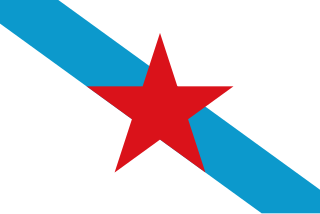Related Research Articles
Galician Revolutionary Students was a leftwing nationalist students organization in Galicia, Spain. ERGA functioned as the students wing of the Galician People's Union (UPG). ERGA was founded in 1972. ERGA published a monthly, Lume. ERGA was the first mass organization of nationalism after the Spanish Civil War, got a broad presence in the universities and high schools of Galiza and formed future UPG leaders and militants.
The Galician People's Union is a Galician nationalist and communist political party, and is one of the registered political parties of Spain. The party publishes the magazine Terra e Tempo, and the secretary general is Néstor Rego.

The Partido Galeguista was a Galician party founded in 1978, referring to itself as the historical descendant of the Partido Galeguista in the Second Spanish Republic (1931-1939).

The Galician People's Party was a Galician political party in the first years of the Spanish democracy.

Galician nationalism is a form of nationalism found mostly in Galicia, which asserts that Galicians are a nation and that promotes the cultural unity of Galicians. The political movement referred to as modern Galician nationalism was born at the beginning of the twentieth century from the idea of Galicianism.
The Autonomous Galician Republican Organization was a Spanish left-wing republican and Galician nationalist party in Galicia. It was founded in October 1929 in A Coruña by Santiago Casares Quiroga and Antón Vilar Ponte with the participation of the Irmandades da Fala.

The National Inter-Union of the Galician Workers was a Galician union with an anticapitalist, leftist and Galician nationalist ideology, direct heir of the Intersindical Nacional Galega (ING), and precursor of Confederación Intersindical Galega (CIG).

The Galician National-Popular Bloc was a Galician electoral candidacy. It had as the national sovereignty for Galiza as its main objective and as an alternative to autonomism. It was formed by the Galician People's Union (UPG) and Galician National-Popular Assembly (ANPG).

The Galician Socialist Party–Galician Left was a Galician nationalist and left-wing party of Galiza.

The Galician Socialist Party was a socialist and Galician nationalist political party active in Galicia.
The Galician People's Assembly was a political organization founded on October 10, 1976 by a splinter group of the Galician National-Popular Assembly. The APG considered AN-PG to close to the Galician People's Union. Its leaders were Xan López Facal, César Portela, Carlos Vázquez and Mario López Rico. The organization held its first congress in December 1976. The APG supported the Galician Socialist Party, a splinter of the agrarian union Comisións Labregas, called Comisións Labregas Terra and the Comités de Traballadores Galegos. The APG participated in the launching of the magazine Teima (1976-1977). The APG ceased to exist on December 4, 1977; that same year part of his membership helped to found the Galician Workers Party (POG).
Dereita Galeguista was a right-wing Galician nationalist party active in the final months of the Second Spanish Republic.
The Galician Social Democratic Party was a Galician political party with a Galician nationalist and social democratic ideology.
The Galician Nationalist Party–Galicianist Party was a Galician nationalist and liberal political party, coming from a split of the Galician Coalition. The PNG–PG had 132 members in 2002. Xosé Mosquera Casero was the last secretary general, after the VIII Congress in September 2011. The party merged with Commitment to Galicia in 2012.
The Nationalist Galicianist Party (PGN or PG(N), Partido Galeguista Nacionalista or Partido Galeguista (Nacionalista) in Galician language) was a Galician nationalist party founded in 1984.

The Intersindical Nacional Galega was a nationalist and anticapitalist galician union formed in March 1977 as a result of the merge of the Galician Workers Union, UTEG, UTSG, UTBG, STGAP and the SGTM. Francisco García Montes was elected Secretary General. The ING celebrated its first Congress in October 1977.
The Galician Regionalist Association was an active regionalist political organization in Galicia between 1890 and 1892.

Galician Coalition is a political party in Galicia, Spain with a Galician nationalist and centrist ideology. Since 2012 CG is part of the coalition Compromiso por Galicia.
The Republican Nationalist Party of Ourense was a Galician nationalist party founded in late 1930 based in the province of Ourense. The main leaders of the party were Ramón Otero Pedrayo, Xaquín Lorenzo Fernández, Florentino López Cuevillas and Vicente Risco.
Galician Unity was a Galician nationalist and democratic socialist party formed by the Galician Socialist Party-Galician Left (PSG-EG) in 1991.
References
- 1 2 Beramendi, X.G. and Núñez Seixas, X.M. (1996): O nacionalismo galego. A Nosa Terra, Vigo
- ↑ "Libros e eBooks, descuentos y envíos gratis | Casa del Libro". casadellibro.
- ↑ March, n Juan. "Artículo: Nace el Partido Obreiro Galego - Diario 16 - 04/10/1977". Archivo Linz de la Transición española • Fundación Juan March (in Spanish). Retrieved 2021-04-13.
- ↑ Muruais, Perfecto Conde (January 17, 1979). "Unidade Galega, primera coalición galleguista" – via elpais.com.